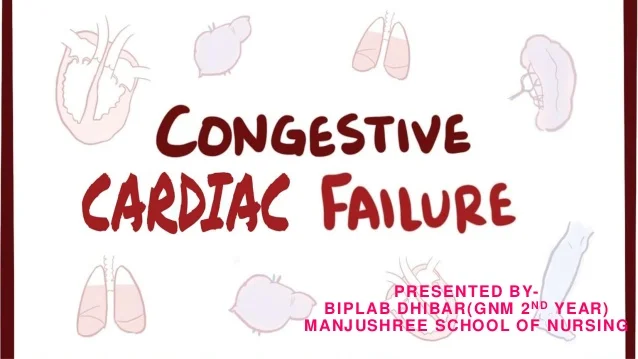Congestive cardiac failure (CCF), also known as heart failure, is a complex medical condition that affects millions of people worldwide. This article delves into the intricacies of CCF, exploring its causes, symptoms, diagnosis, treatment options, and preventive measures.
What is Congestive Cardiac Failure (CCF)?
CCF occurs when the heart is unable to pump blood effectively to meet the body’s needs. This can result from various underlying conditions that weaken the heart muscle or disrupt its normal function. As a result, fluid can build up in the lungs, liver, and other parts of the body, leading to symptoms such as shortness of breath, fatigue, and swelling.
Causes of CCF
There are several factors that can contribute to the development of CCF:
1. Coronary Artery Disease (CAD): Blockages in the coronary arteries can reduce blood flow to the heart muscle, leading to heart damage and CCF.
2. Hypertension (High Blood Pressure): Prolonged high blood pressure can strain the heart and contribute to CCF over time.
3. Cardiomyopathy: This is a disease of the heart muscle that can weaken the heart and impair its pumping ability.
4. Valvular Heart Disease: Conditions such as valve stenosis or regurgitation can affect the heart’s function and contribute to CCF.
5. Arrhythmias: Irregular heart rhythms can disrupt the heart’s pumping ability and lead to CCF.
Symptoms of CCF
The symptoms of CCF can vary depending on the severity of the condition. Common symptoms include:
- Shortness of breath, especially during physical activity or when lying down
- Fatigue and weakness
- Swelling in the legs, ankles, or abdomen
- Rapid or irregular heartbeat
- Persistent coughing or wheezing
- Reduced ability to exercise
- Sudden weight gain due to fluid retention
Diagnosis of CCF
Diagnosing CCF typically involves a combination of medical history review, physical examination, and diagnostic tests. These may include:
1. Echocardiogram: This ultrasound test provides detailed images of the heart’s structure and function, helping to assess the pumping ability and detect abnormalities.
2. Electrocardiogram (ECG): This test records the heart’s electrical activity and can reveal irregularities or signs of heart damage.
3. Blood Tests: These tests can assess kidney function, electrolyte levels, and biomarkers indicative of heart failure.
4. Chest X-ray: This imaging test can show signs of fluid buildup in the lungs, a common complication of CCF.
5. Cardiac MRI or CT Scan: These imaging techniques can provide detailed information about the heart’s structure and function, helping to diagnose CCF and identify underlying causes.
Treatment Options for CCF
The management of CCF involves a comprehensive approach aimed at relieving symptoms, improving heart function, and addressing underlying causes. Treatment options may include:
Medications:
- ACE inhibitors, beta-blockers, and diuretics to reduce blood pressure, relieve fluid buildup, and improve heart function.
- Digoxin to help strengthen the heart’s contractions.
- Anticoagulants or antiplatelet medications to reduce the risk of blood clots.
Lifestyle Modifications:
- Following a heart-healthy diet low in sodium and saturated fats.
- Engaging in regular physical activity as tolerated.
- Quitting smoking and limiting alcohol consumption.
- Monitoring fluid intake and weight daily to detect changes early.
Medical Procedures:
- Implantable devices such as pacemakers or defibrillators to regulate heart rhythm and prevent sudden cardiac death.
- Coronary artery bypass grafting (CABG) or angioplasty with stenting to improve blood flow to the heart in cases of coronary artery disease.
- Heart valve repair or replacement surgery for valvular heart disease.
Cardiac Rehabilitation:
A structured program that includes exercise training, education, and counseling to improve heart health and quality of life.
Preventive Measures
While some risk factors for CCF, such as age and family history, cannot be changed, there are steps individuals can take to reduce their risk or manage existing conditions:
- Maintain a healthy weight and body mass index (BMI).
- Control blood pressure, cholesterol levels, and blood sugar levels.
- Follow a balanced diet rich in fruits, vegetables, whole grains, and lean proteins.
- Stay physically active and incorporate regular exercise into daily routines.
- Avoid smoking and limit alcohol consumption.
- Manage stress through relaxation techniques, mindfulness, or counseling.
Conclusion
Congestive cardiac failure (CCF) is a serious medical condition that requires ongoing management and monitoring. By understanding its causes, symptoms, diagnosis, treatment options, and preventive measures, individuals can take proactive steps to manage their heart health and improve their quality of life. Regular medical follow-ups, adherence to treatment plans, and healthy lifestyle choices are essential components of managing CCF effectively.


